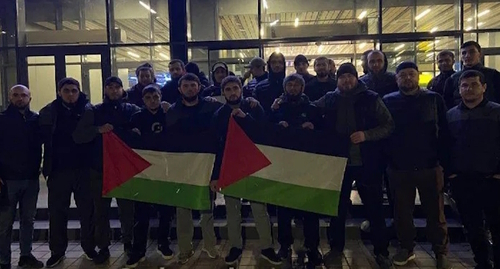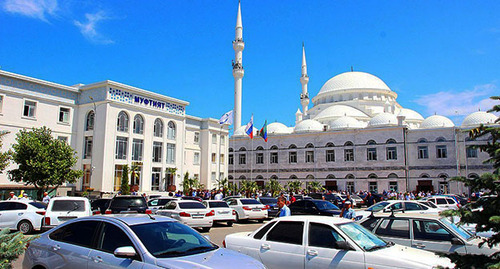Palestinian Refugees in Dagestan: The world has turned its eyes once again to Gaza, where the humanitarian crisis continues to deepen. In a rare development, reports from Palestinian users claim that 50 Gazans managed to leave Gaza and were received in Dagestan, a region in the North Caucasus, part of Russia. This unprecedented move shines a light on the desperate plight of civilians trapped in conflict and the global responses shaping their fate.

The Escape From Gaza
For months, Gaza has been under heavy bombardment and blockades, leaving its residents struggling for food, medicine, and safety. The claim that 50 Gazans escaped and became Palestinian refugees in Dagestan has stirred conversation across social media platforms. While official confirmation remains limited, the news has sparked global interest and raised questions about how such a transfer was arranged.
The escape highlights both the resilience of civilians and the geopolitical complexities of the Gaza conflict. For many, Dagestan, a Muslim-majority republic within Russia, symbolizes a place of refuge where religious and cultural ties may provide comfort.
Why Dagestan Welcomed Palestinian Refugees
The arrival of Palestinian refugees in Dagestan is not only symbolic but also politically significant. Dagestan, situated in the North Caucasus, has a history of cultural diversity and strong Islamic traditions. Local communities reportedly welcomed the Gazans, offering them shelter and support in their time of need.
Humanitarian experts point out that Russia, by hosting these refugees, may also be sending a message about its stance on Middle Eastern conflicts. Offering safety to Palestinians highlights Moscow’s diplomatic interest in maintaining strong relations with Muslim nations.
Voices From Palestinian Users
The claim that Palestinian refugees in Dagestan were received with open arms first surfaced through Palestinian users online. Posts described how the group of 50 Gazans crossed borders under dire circumstances, eventually reaching safety.
While the details of their journey remain unclear, these voices emphasize the desperate measures families are taking to survive. With thousands killed and displaced in Gaza, even a small group finding refuge abroad is seen as a symbolic victory of endurance.
Global Context: Palestinian Refugees Beyond the Middle East
The story of Palestinian refugees in Dagestan connects to a larger narrative. According to the United Nations Relief and Works Agency (UNRWA), there are already over 5.9 million registered Palestinian refugees worldwide, with the majority in Jordan, Lebanon, and Syria.
However, Russia has historically received smaller numbers of Palestinians. Hosting 50 Gazans may appear minor in scale, but it carries great symbolic value. It demonstrates that even countries far beyond the Middle East are now part of the refugee story.
Life for Refugees in Dagestan
The future of the Palestinian refugees in Dagestan is still uncertain. Integrating into Dagestani society may be easier due to shared Islamic traditions, but cultural, linguistic, and legal challenges remain.
Russian officials have not yet released a clear policy statement about whether these Palestinians will receive permanent residency, temporary asylum, or humanitarian status. For the refugees themselves, immediate safety is the top priority, but long-term stability will require strong governmental and community support.

Reactions From Israel and Global Leaders
The news of Palestinian refugees in Dagestan also carries political weight. Critics argue that while Russia accepts refugees, the international community is still divided over recognizing Palestinian statehood and offering consistent humanitarian corridors.
Israel has not commented directly on this development but continues to maintain strict control over border crossings, making any exit from Gaza extremely difficult. Western leaders have called for more humanitarian access, but actions remain limited compared to the urgent needs on the ground.
A Symbol of Hope Amid Tragedy
Though only 50 individuals, the escape of these Palestinian refugees in Dagestan represents hope amid despair. Each life saved is a reminder of the resilience of ordinary Gazans caught in extraordinary suffering.
For Palestinians still trapped, this development serves as proof that global solidarity exists, even if on a small scale. For Dagestan, it highlights the region’s ability to play a compassionate role in a crisis far beyond its borders.
Lessons From This Refugee Story
The Palestinian refugees in Dagestan case sheds light on several critical lessons:
-
Every life matters – even small groups of refugees deserve recognition and support.
-
Geopolitical connections matter – hosting refugees often signals larger political stances.
-
Cultural affinity helps integration – Muslim-majority regions like Dagestan can ease the adjustment process.
-
Social media amplifies voices – Palestinian users played a key role in bringing this story to global attention.
-
Humanitarian corridors are essential – without safe passages, countless more lives remain at risk.
Conclusion: The Future of Refugees From Gaza
The story of Palestinian refugees in Dagestan is more than a headline, it’s a testament to survival, resilience, and the importance of global compassion. While 50 Gazans may seem a small number compared to the thousands suffering in Gaza, their journey sends a powerful message.
It shows that pathways to safety, though limited, are possible. It also reminds the world that every effort to save even a handful of lives matters in the broader pursuit of peace and justice.
As the Gaza crisis continues, the fate of these 50 refugees may inspire further humanitarian action, pushing nations to reconsider their role in alleviating suffering.
